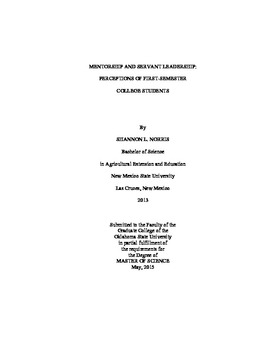| dc.contributor.advisor | Sitton, Shelly R. | |
| dc.contributor.author | Norris, Shannon Louise | |
| dc.date.accessioned | 2016-09-29T18:36:12Z | |
| dc.date.available | 2016-09-29T18:36:12Z | |
| dc.date.issued | 2015-05-01 | |
| dc.identifier.uri | https://hdl.handle.net/11244/45194 | |
| dc.description.abstract | The millennial generation is one of the most vulnerable and disconnected generations to enter a college classroom. The use of quality mentorship, both inside and outside of academia, helps students understand the purpose of their education, which influences students� productivity, work ethic, and intrinsic motivation. Investigating mentorship through the lens of servant leadership connects service-oriented and leadership traits to qualities students desire in personal mentors. The purpose of this study is to describe incoming first-semester students� perceptions of servant leadership in personal mentors at the beginning and end of the Fall 2014 AG 1011 � Freshmen Orientation class in the College of Agricultural Sciences and Natural Resources (CASNR) at Oklahoma State University. The study also sought to address the current mentorship needs of CASNR incoming students in the Fall 2014 semester.The study used longitudinal, panel survey design employed with a census approach to describe perceptions of servant leadership traits and mentorship preferences of the incoming students in the CASNR AG 1011 � Freshmen Orientation course (N = 485). The study used the Servant Leadership Survey (SLS) and a researcher-designed general mentorship and demographic inventory questionnaire administered through an eight-week deferred pre- and post-questionnaire.Based on the SLS and the researcher-designed mentorship questionnaire, students rated accountability and empowerment as the highest servant leadership traits in their personal mentors. Parents were identified as the most common mentor, and student and peer mentors showed the greatest increase between the beginning and end of the course. Nearly one-third of students changed who they identified as their personal mentors at the beginning and end of the course. The study yielded the following recommendations for practice and research: (a) engage mentorship programs specifically targeting servant leadership; (b) connect students to their respective university mission through guided mentor opportunities; (c) implement feedback components in mentorship programs in higher education; (d) expand knowledge of how students seek and develop mentorship relationships; (e) investigate the influence of peer mentorship; (f) conduct similar studies with different populations to describe servant leadership traits in different contexts; and (g) investigate students� perceptions of servant leadership over time. | |
| dc.format | application/pdf | |
| dc.language | en_US | |
| dc.rights | Copyright is held by the author who has granted the Oklahoma State University Library the non-exclusive right to share this material in its institutional repository. Contact Digital Library Services at lib-dls@okstate.edu or 405-744-9161 for the permission policy on the use, reproduction or distribution of this material. | |
| dc.title | Mentorship and Servant Leadership: Perceptions of First-semester College Students | |
| dc.type | text | |
| dc.contributor.committeeMember | Cartmell, Dwayne | |
| dc.contributor.committeeMember | Terry, Robert | |
| dc.contributor.committeeMember | Baker, Marshall A. | |
| osu.filename | Norris_okstate_0664M_14015.pdf | |
| osu.accesstype | Open Access | |
| dc.description.department | Agricultural Education | |
| dc.type.genre | Thesis | |
